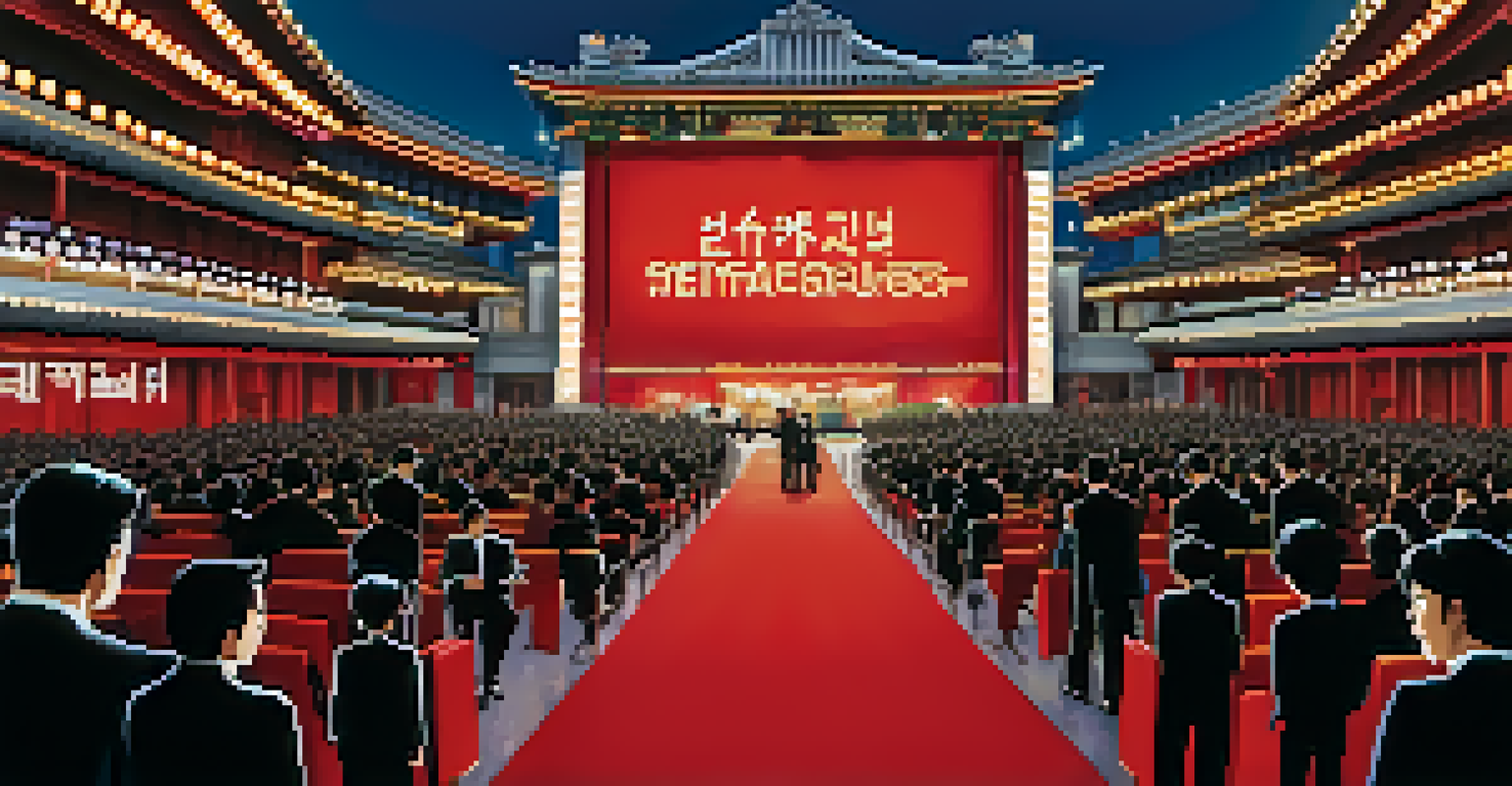South Korean Cinema: Rise of Unique Storytelling in Film

The Global Surge of South Korean Cinema
In recent years, South Korean cinema has captured the world's attention, transforming from a niche market to a significant player in global film. This rise is marked by unique storytelling techniques and fresh perspectives that resonate with audiences everywhere. Movies like 'Parasite' and 'Train to Busan' have not only won awards but also sparked conversations about societal issues, showcasing the power of film as a medium for change.
Films can be a powerful medium for social change, reflecting the complexities of society and challenging viewers to think critically about their world.
One standout aspect of South Korean films is their ability to blend genres seamlessly. Whether it’s mixing horror with comedy or drama with action, filmmakers craft narratives that keep viewers on the edge of their seats. This innovative approach reflects a cultural shift towards embracing complexity in storytelling, making their films relatable and engaging for diverse audiences.
Additionally, the increasing availability of South Korean content through streaming platforms has widened its reach. Viewers across the globe can now experience these rich narratives, leading to heightened interest and demand. This accessibility not only amplifies the voices of South Korean filmmakers but also invites international collaboration and influences.
Unique Narrative Techniques in Korean Films
One of the hallmarks of South Korean cinema is its distinctive narrative style. Filmmakers often utilize non-linear storytelling, allowing audiences to piece together plots like puzzles. This method encourages viewers to engage deeply with the film, fostering a more immersive experience as they navigate through the layers of the story.

Moreover, character development plays a pivotal role in these narratives. South Korean films often portray flawed, complex characters that reflect the intricacies of real life. This representation not only adds depth to the story but also allows audiences to connect emotionally, making the viewing experience all the more impactful.
Global Impact of Korean Cinema
South Korean cinema has evolved into a significant player on the global stage, with films like 'Parasite' and 'Train to Busan' sparking important societal conversations.
Additionally, social commentary is intricately woven into many films, addressing issues like class disparity, familial relationships, and mental health. By tackling these themes, filmmakers invite viewers to reflect on their own societies, making the narratives not just entertaining but also thought-provoking.
The Influence of Cultural Elements on Storytelling
Cultural influences are at the heart of South Korean cinema, enriching the storytelling process. Traditional values, folklore, and historical events often find their way into modern narratives, creating a unique blend of old and new. This cultural richness adds layers of meaning to the films, allowing audiences to explore South Korea’s heritage through the lens of contemporary issues.
Cinema should reflect the complexity of life, and that's what South Korean filmmakers are doing so beautifully.
Moreover, the use of local dialects and regional settings enhances the authenticity of the stories. By grounding the narratives in specific cultural contexts, filmmakers invite viewers to experience the unique societal dynamics of South Korea. This not only educates international audiences but also fosters appreciation for the country’s diverse culture.
As a result, these culturally infused stories resonate on multiple levels, making them relatable to both local and global audiences. The ability to balance cultural specificity with universal themes is a testament to the skill of South Korean filmmakers in crafting compelling narratives.
The Role of Festivals in Promoting Korean Cinema
Film festivals play a crucial role in elevating South Korean cinema on the international stage. Events like the Cannes Film Festival and Busan International Film Festival showcase the works of talented South Korean directors, providing a platform for their unique storytelling. Such exposure not only garners critical acclaim but also attracts global distributors eager to share these narratives with wider audiences.
Additionally, these festivals foster networking opportunities for filmmakers, opening doors for collaborations and co-productions. This interconnectedness can lead to the sharing of innovative storytelling techniques and creative ideas, further enriching the cinematic landscape. As a result, South Korean cinema continues to evolve, reflecting both local and global influences.
Innovative Storytelling Techniques
Filmmakers in South Korea utilize non-linear narratives and complex character development, creating engaging stories that resonate on both local and global levels.
Moreover, the success of South Korean films at international festivals has created a ripple effect, inspiring new filmmakers to explore unconventional narratives. This trend encourages a vibrant filmmaking community that values creativity and originality, contributing to the sustained growth of the industry.
The Impact of Streaming Platforms on Accessibility
The rise of streaming platforms has revolutionized how audiences access South Korean cinema. Services like Netflix and Amazon Prime have made a diverse array of Korean films available to viewers worldwide, breaking geographical barriers. This accessibility has led to a surge in interest, as audiences are eager to explore fresh stories that challenge traditional norms.
Streaming platforms also provide a space for lesser-known films to find their audience. Unlike traditional cinema, where marketing budgets can dictate a film's visibility, streaming services often feature a wide range of content. This democratization of film distribution allows unique stories to shine, regardless of their commercial appeal.
Furthermore, the global success of South Korean films on these platforms has prompted international collaborations. Filmmakers are now exploring co-productions that blend different cultural perspectives, enriching the storytelling experience. This trend not only broadens the scope of narratives but also fosters a sense of global community through shared cinematic experiences.
The Intersection of Technology and Storytelling
Technology plays an instrumental role in the evolution of South Korean cinema, particularly in enhancing storytelling techniques. Advances in visual effects and cinematography allow filmmakers to create stunning visuals that complement their narratives. This combination of artistry and technology captivates audiences, drawing them into the film's world and heightening their emotional connection.
Moreover, innovative storytelling formats, such as virtual reality and interactive films, are emerging within the South Korean film industry. These formats invite audiences to participate in the narrative, creating a more engaging experience. By breaking the traditional boundaries of storytelling, South Korean filmmakers are redefining how stories can be told and experienced.
Streaming Platforms Boost Accessibility
The rise of streaming services has made South Korean films widely accessible, allowing diverse audiences to explore unique narratives that challenge traditional norms.
As technology continues to evolve, South Korean cinema remains at the forefront of experimentation. By embracing new tools and techniques, filmmakers can push creative boundaries, resulting in fresh narratives that resonate with modern audiences. This commitment to innovation ensures that South Korean cinema will continue to thrive in an ever-changing landscape.
Looking Ahead: The Future of Korean Cinema
As South Korean cinema gains prominence worldwide, its future looks incredibly promising. The unique storytelling methods that have captivated audiences are likely to evolve further, incorporating even more diverse perspectives. This evolution will not only enhance the richness of narratives but also reflect the complexities of a rapidly changing world.
Emerging filmmakers are stepping onto the scene, bringing fresh ideas and innovative approaches to storytelling. This influx of new talent is vital for the industry, as it encourages experimentation and exploration of unconventional narratives. With each new voice, South Korean cinema continues to expand its horizons, ensuring that it remains relevant and engaging.

Ultimately, the global fascination with South Korean films underscores the universal appeal of well-crafted stories. As filmmakers balance local culture with global themes, audiences will continue to find connections in these narratives, making South Korean cinema a significant force in the future of film.